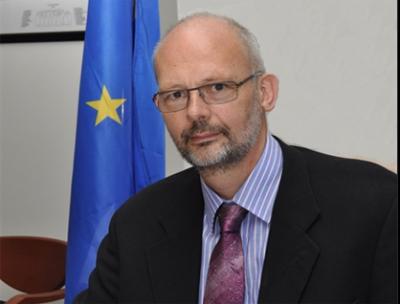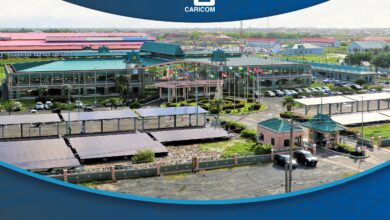BRIDGETOWN, Barbados, Oct 1, CMC – The head of the European Union Delegation to Barbados and the Eastern Caribbean, Ambassador Mikael Barfod says if the Caribbean is to fully integrate renewable energy into its development path so that it impacts on its economy, then it must adjust its mind-set to do so.
Barfod, who will be participating in the October 6-8 Caribbean Renewable Energy Forum in Miami, said currently, access to renewable energy in the region is much skewed.
“Only a few Caribbean citizens have had the opportunity to educate themselves on the benefits, and even fewer have actually implemented various renewable energy systems with attendant benefits, despite the affordability of the technology, financing opportunities and very impressive “payback” periods.
“Renewable energy seems to be perceived as being for the “elites”, while in many countries in the region the fuel adjustment clause still hits the most vulnerable harder than the rest of the population,” he added.
Barfod, in an article entitled “Renewable Energy – Bridging the Caribbean Divide – An EU perspective” said the Caribbean must adopt an renewable energy mentality, even as he acknowledged that “this is no doubt easier said than done”.
But he argued that with the high education levels of the region, relatively robust governance systems, proximity to and extensive exchanges with very developed economies and the substantial amounts of investments offered by both donor agencies and the private sector, a very sound basis exists on which to achieve the goals of the region”.
He said the Caribbean realities of low penetration of renewable energy, insufficient renewable energy specialists and technicians; energy monopolies non- implementation of policies, legislation and regulations as well as relatively low public awareness are well known and documented.
Barfod said that education, lifestyle changes, policy, legislation and regulation are factors that should be considered among the “first steps” to overcome the impediments.
“Education is fundamental. Similar to the efforts in the hospitality sector, the renewable energy sector must ensure that all aspects of the sector are captured at various levels of the school
curriculum.
“The curriculum at the primary, secondary and tertiary level should all feature aspects of the renewable energy subject matter. In this regard, it is vital that a gender balanced approach is adopted. On a general level too public education should inform citizens of the region on making energy choices when purchasing appliances and the affordability and financing options for installing renewable energy equipment in their homes.”
He said essentially the Caribbean is fighting an undeclared conflict on high energy prices and energy insecurity, both of which have significantly adverse effects on the development of the region.
“At the same time, the Caribbean will cement its already strong moral case in international climate change negotiations by a radical adoption of renewable energy and energy efficient measures.”
Barfod said volumes have been written on the importance of legislation, policy and regulation for establishing sound investment climates and general sector development frameworks.
“However, it is not sufficient merely to enact these. They must be implemented, regularly updated and reviewed by all stakeholders in a country to reflect changing technologies, changing times and to encourage, mandate and inform the renewable energy development strategy.
“These are pre- requisites for bridging the divide. It may be claimed that in many countries of the region, these already exist. This is well, but are they then also translated into action? If this is not the case, stakeholders must collectively find out why not.”
The European Union diplomat said policies, legislation and regulation should not be seen as passive documents but must be actively reworked to deliver and reflect changing times, technologies and circumstances.
“There are countless examples of countries, cities, utilities and organisations that have taken ambitious strides in renewable energy and energy efficiency, it is time that the Caribbean shows its strength and joins this group – sooner rather than later.”







